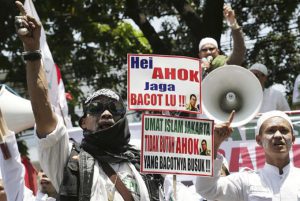Al Jazeera’s Inside Story this week features the “blasphemy” trial against Indonesia’s Christian Basuki “Ahok” Tjahaja Purnama and asks if the 1969 law is being misused against the Jakarta governor.
Rights groups in Indonesia have long accused the government of using the country’s 1969 blasphemy law to persecute religious minorities, but for the first time the law is being used against a high-ranking politician.
A senior Indonesian cabinet minister says the government is not losing the fight against “radicalism” despite the success of Islamic groups in attracting hundreds of thousands of people to protests against the capital’s Christian governor.
Luhut Binsar Pandjaitan, who is close to President Joko “Jokowi” Widodo, said that the government needed to reinforce Indonesia’s founding ideology “Pancasila” – whose five principles include national unity and social justice. He said it has been neglected since the fall of dictator Suharto in 1998 ushered in democratic rule.
Pandjaitan told a Jakarta Foreign Correspondents Club event this week: “We are not losing control.”
The Jakarta governor, Basuki “Ahok” Tjahaja Purnama, is on trial for alleged blasphemy and faces up to five years in prison.
A sprawling Southeast Asian nation of 250 million people, Indonesia is the world’s most populous Muslim country.
Massive protests demanding Ahok’s arrest have challenged the image of Indonesia as practising a moderate form of Islam and shaken the secular government.
Muslims in Indonesia protest over Christian governor
The blasphemy furore has also given a national stage to the Islamic Defenders Front, previously better known as a morals vigilante group with members involved in protection rackets.
Its leader, Rizieq Shihab, told a December 2 protest in Jakarta that Indonesia would be peaceful if there was no blasphemy and other problems such as gays.

Pandjaitan suggested that the government has Shihab in its sights.
“We have quite detailed data about him. We’ll see what happens. We know what we are going to do,” he said. “The president is very brave, to do whatever is necessary for the benefit of this country. No hesitation at all.”
A November 2 protest against Ahok in Jakarta turned violent, with one death and dozens of police and protesters injured.
Critics say Widodo’s government has not done enough to contain the religious and ethnic tension that is mounting in the run-up to a city governor election in February.
Purnama – a Christian and the first ethnic Chinese in the post – will compete for re-election against two Muslims – Agus Harimurti Yudhoyono, a son of former president Susilo Bambang Yudhoyono, and a former education minister, Anies Baswedan.
Ethnic Chinese make up just over 1 percent of Indonesia’s 250 million people, and they typically do not enter politics.













































